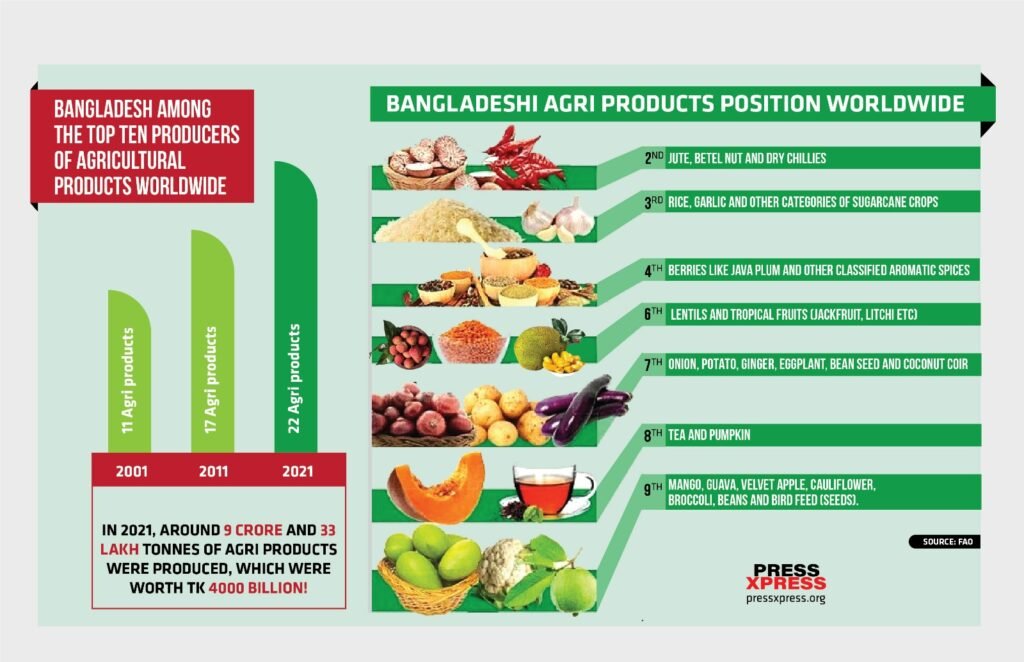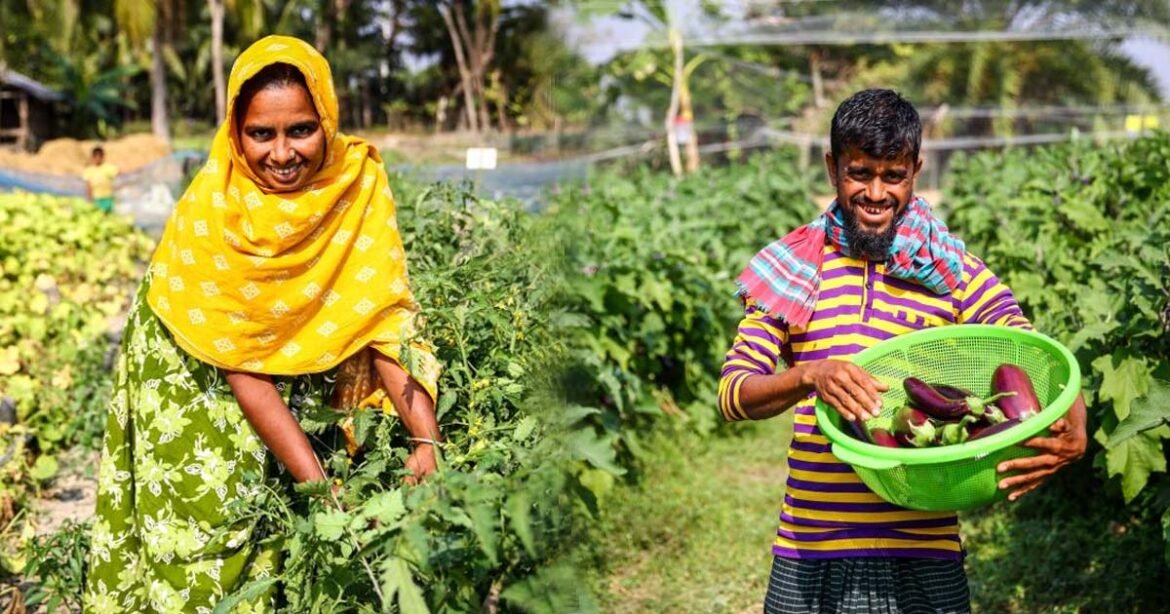Bangladesh’s robust farming sector and abundant agricultural resources have propelled the country to secure top ten rankings in the production of 22 diverse agricultural products on a global scale. These rankings, developed by the Food and Agriculture Organization (FAO) of the United Nations, highlight Bangladesh’s remarkable achievements in agricultural production.
The most recent FAO report, published in March with data from 2021, indicates that Bangladesh, despite being the 94th largest country in terms of land area, has risen to 14th place globally in terms of primary agricultural commodity production. This remarkable achievement is further accentuated by the fact that China, India, and the United States dominate the top three positions in agriculture.
Bangladesh is among the top ten producers of 22 agricultural products, including rice, lentils, potatoes, onions, tea, and various fruits. Notably, Bangladesh has also made notable strides in vegetable production, emerging as a prominent producer of products such as pumpkin and cauliflower over the past decade.
Bangladesh’s rising presence and global agricultural achievements
Bangladesh’s remarkable agricultural output of 93.3 million tonnes worth USD 36.11 billion showcases the country’s agricultural prowess and importance on the global agricultural market. This consistent rise in rankings demonstrates Bangladesh’s dedication to agricultural development and the sector’s potential for further expansion. Bangladesh has firmly established itself as a major participant in the global agricultural landscape by capitalizing on its fertile soil and maximizing agricultural resources.
The FAO analyzed the volume of global production of 162 primary crop commodities. Bangladesh generates 68 of these. Intriguingly, Bangladesh’s presence on the list of the top ten producers has increased over time, from eleven commodities in 2001 to twenty-two in 2021. Onions, pumpkins, cauliflower, broccoli, bird feed (seeds), and other legume categories are among the new additions to the list.

Agriculture Minister Abdur Razzaque recognizes the factors that have contributed to Bangladesh’s agricultural success, including its geographical location, favorable weather conditions, and ample land. Bangladesh ranking among the top ten global producers of various commodities, is an outcome of the government’s efforts, which include providing subsidies, encouraging innovation in new varieties, extending support, and emphasizing agricultural mechanization.
Despite the advancements, the Agriculture Minister acknowledged the need to address obstacles such as inadequate storage facilities, which result in crop deterioration.
Notable rankings and achievements in agricultural production
In 2001, Bangladesh was among the top ten producers for eleven commodities; by 2011, that number had increased to seventeen. In 2021, the nation ranked first in the production of 22 different products.
Bangladesh has attained outstanding rankings in a variety of agricultural categories, positioning itself as a major player on the global market. Bangladesh holds the second-place position in the production of jute, betel nuts, and dried chilies, despite not being the leader in any particular product category. Additionally, it rates third in the categories of rice, garlic, and other sugar crops, and fourth in the categories of berries and aromatic spices.
Bangladesh ranks sixth in terms of lentils and tropical fruits such as jackfruit and litchi, and seventh in terms of onion, potato, ginger, eggplant, legume seeds, and coconut coir. The nation’s agricultural output also places it eighth for tea and pumpkin and ninth for mango, guava, cauliflower, broccoli, peas, and bird feed (seeds).
Bangladesh’s increased potato production is a noteworthy accomplishment, which has risen from the twentieth position to the seventh position, surpassing countries such as Canada, Turkey, and Poland. Bangladesh represented its potential in this sector by producing 9.8 million tons of potatoes in 2021. Bangladesh secures the second-largest global position in dry chili production, surpassing China and Thailand, after India.
In addition, after holding the fourth position in global rice production for more than four decades, Bangladesh jumped to the third place in 2020, surpassing Indonesia. Bangladesh’s lentil production shows remarkable progress, moving from an initial decline to reclaim the sixth position among top global producers.
Bangladesh’s agricultural production impacting imports and exports
In the fiscal year 2021-2022, Bangladesh produced over 2.5 million tonnes of onions, an extraordinary 45 percent increase from six years prior. Therefore, the nation now ranks seventh in the world for production of onions and similar spices. This increase in domestic production has drastically reduced the demand for imports, reducing annual onion imports from 1.2 million tonnes in 2018 to approximately 700,000 tonnes. This decrease in imports has protected foreign currency.
However, Bangladesh continues to experience difficulties in the production of soybean seeds, sugarcane, and cotton, resulting in significant import costs. During the fiscal year 2021-2022, the nation spent USD 4.17 billion on edible oil and sugar imports and USD 4.44 billion on cotton imports. In addition, the recent dollar crisis has disrupted imports of various goods, thereby exacerbating the difficulties in the agricultural industry.
Fortunately, Bangladesh has earned foreign currency through the export of agricultural and agro-processed goods. During the same fiscal year, exports of jute and jute-processed products reached USD 1.13 billion, whereas exports of agriculture and agro-processed products, such as vegetables, preserved foods, and fragrant rice, exceeded USD 1.16 billion. These export earnings contribute to the country’s economic development and demonstrate the agricultural sector’s potential to generate foreign currency.
The continuous increase in agricultural output not only reduces import costs but also strengthens Bangladesh’s position on the international market. For sustained growth and stability in the agricultural sector, addressing domestic production challenges and managing currency fluctuations will be crucial.
Addressing storage challenges for agricultural produce
While Bangladesh is proud of its agricultural achievements, the storage and preservation of agricultural products present challenges. Inadequate storage facilities have resulted in the spoilage of potatoes, vegetables, and melons, preventing the country from maximizing the value of its agricultural output. Recognizing the significance of addressing this issue, the authorities have launched a massive initiative to improve the processing, storage, and marketing of agricultural products. This initiative aims to improve post-harvest infrastructure, reduce spoilage, and establish efficient marketing systems for agricultural products so that Bangladesh’s agricultural sector can realize its maximum potential.
To conclude, the agricultural sector of Bangladesh has achieved top rankings in a number of categories, demonstrating its prowess in global agricultural production. Despite difficulties with storage and import costs, the country’s diverse array of agricultural products contributes considerably to its economic growth and foreign exchange earnings.


